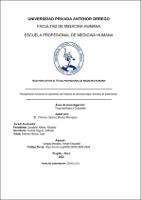Recuperación funcional en pacientes con fractura de clavícula según técnicas de tratamiento

View/
Download
(application/pdf: 536.7Kb)
(application/pdf: 536.7Kb)
Date
2022Author(s)
Chirinos Sipiran, Rosita Mariajose
Metadata
Show full item recordAbstract
Determinar la eficacia del tratamiento conservador, osteosíntesis en cara
superior y anteroinferior con respecto a la recuperación funcional de pacientes adultos
con fractura de clavícula atendidos en el servicio de Traumatología y Ortopedia del
Hospital Víctor Lazarte Echegaray en el periodo Enero 2015 - Diciembre 2019.
MATERIAL Y MÉTODO: Estudio observacional analítico, cohorte retrospectivo, donde
se evaluaron 90 pacientes de 18 a 80 años de ambos sexos, los cuales fueron
clasificados en tres grupos según la técnica utilizada: tratamiento conservador,
osteosíntesis en cara superior y anteroinferior, se les realizó una encuesta para valorar
la recuperación funcional por medio de score de Quick DASH a los 6 meses del
tratamiento.
RESULTADOS: Estadísticamente hay diferencias significativas en las tres técnicas de
tratamiento según su recuperación funcional mediante la puntuación de QUICK DASH
(p = 0,000). En el análisis empleando la prueba HSD Tukey, se halló que el
tratamiento de osteosíntesis de cara anteroinferior (15,715), muestra diferencia
significativa respecto al conservador (33,976) y al de osteosíntesis en cara superior
(28,083) (p = 0,000). Se presentó menos porcentaje de morbilidad tardía en los
pacientes sometidos a osteosíntesis en cara anteroinferior (27%) (p=0.000).
CONCLUSIONES: El tratamiento de osteosíntesis anteroinferior es más eficaz que el
tratamiento conservador y de osteosíntesis de cara superior To determine the efficacy of conservative treatment, osteosynthesis the
superior and anteroinferior with regard to the functional recovery of adult patients with
clavicle fractures treated at the Traumatology and Orthopedics service of the Víctor
Lazarte Echegaray Hospital in the period January 2015 - December 2019.
MATERIAL AND METHOD: Analytical observational study, retrospective cohort, where
90 patients aged 18 to 80 years of both genders were evaluated, which were classified
into three groups according to the technique used: conservative treatment,
osteosynthesis in the superior and anteroinferior, a survey was carried out to assess
functional recovery using Quick DASH score 6 months after treatment
RESULTS: Statistically there are significant differences in the three treatment
techniques according to their functional recovery using the QUICK DASH score (p =
0.000). And in the subsequent analysis using the HSD Tukey test, it was found that the
osteosynthesis treatment of the anteroinferior (15,715) shows a significant difference
with respect to the conservative (33,976) and the osteosynthesis in the superior
(28,083) (p = 0.000). There was a lower percentage of late morbidity in patients who
underwent osteosynthesis in the anterior inferior face (27%) (p = 0.000).
CONCLUSIONS: Anteroinferior osteosynthesis treatment is more effective than
conservative and the superior osteosynthesis treatment.
Collections
- Medicina Humana [2969]

